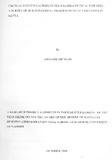| dc.description.abstract | The Kenyan pharmaceutical industry is characterized by intense competition and increased customer awareness of their healthcare needs. This study was carried out in Nairobi, Kenya between June and July. 2010 with an objective to determine the critical success factors in the multinational pharmaceutical companies in Kenya. With an understanding of the critical success factors a firm can gain competitive advantage by devoting their resources in the desired direction, and effectively developing an edge that will ensure a route to above-average profits in the industry and therefore, the multinational pharmaceutical firms shall be able to use the research findings and recommendations to develop better strategic management practices.
The survey study covered the entire population of 28 multinational pharmaceutical companies based in Kenya out of which 24 responded, representing a response rate of 85%. Data were collected using semi-structured and open-ended questionnaires which were administered to the respondents by the researcher using personal interviews and in some cases drop and pick later approach. The data were summarized in an Excel Spreadsheet and analyzed using descriptive statistics and content analysis. Findings were presented in tables, charts, graphs for discussion and interpretation.
The findings revealed that multinational pharmaceutical companies do employ marketing strategies as well as strategic management practices that are relevant to the industry in order to succeed in the sector. It confirmed that in deed financial strategy, employee morale and performance are considered as critical success factors for the multi-national pharmaceutical companies in Kenya. The other critical success factors that the multinational companies consider as being of very high importance included: a robust research and development capability, key opinion leader development, well trained and highly effective sales force (medical representatives), good staff attraction and retention, product quality and efficacy, sponsorships, appropriate market segmentation and building sustainable relationships with customers.
The respondents were managers in the multinational pharmaceutical firms who exhibited a very high knowledge of the industry, customers and a great awareness of what every other firm sells and their activities. The researcher recommends that the pharmaceutical companies endeavor to ensure that their core competencies are centered around the identified critical success factors for them to remain relevant and successful in the market which is constantly changing. The study also indicated that with the liberalization of the industry, the multinational pharmaceutical companies have experienced challenges which include counterfeits, illegal trade in pharmaceuticals and cheap generics. The researcher had difficulties in getting adequate responses from all the targeted managers as they cited tight work schedules and fear of giving too much information and hence could not give in depth interviews, which proved to be a limitation of the study. | en_US |

